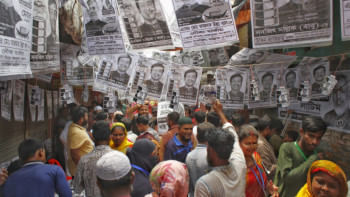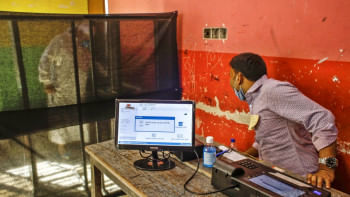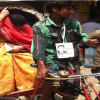Future lawmakers, or lawbreakers?

As the country gears up for the 12th parliamentary election, it is disheartening to see the landscape marred by laminated and polythene-coated posters, despite a ban on their use by the Election Commission. The problem has been especially prevalent in Dhaka which has been plastered with such posters mostly by ruling party candidates, and to a lesser degree by independents and candidates from smaller parties. The plastic coating is apparently used to protect posters from being ruined by fog. But that doesn't justify breaching a ban meant to reduce the environmental cost of election campaigning.
The proliferation of such posters, however, is but part of a wider concern about environmental degradation in conventional campaigns. Besides plastic pollution, candidates have also been seen using high-volume microphones and loud music across the city, causing discomfort to the public, especially vulnerable groups like the sick, children, and the elderly. The wide distribution of promotional materials like caps and leaflets, which are invariably thrown away, or irresponsible use of disposable items like cups and plates by supporters is also posing a threat to the health of the city.
This is totally unacceptable. Candidates, many among them future lawmakers, are expected to lead by example, not encourage or be themselves engaged in breaching environmental regulations. Unfortunately, despite having the scope for alternative, modern campaigning practices using digital platforms, our politicians still seem to prefer conventional methods of public engagement. According to a study by the Environment and Social Development Organization (ESDO), the 2020 mayoral election in Dhaka saw the use of a staggering 340 million plastic-coated posters. The number could double this time, the ESDO warns. During a visit to a number of constituencies in Dhaka, our reporter saw plastic-coated posters being used indiscriminately.
Who will take responsibility for the environmental repercussions of such actions? Why is the Election Commission failing to prevent them, or punish non-compliant candidates and parties? Experts talked about the importance of including the ban on plastic use in campaigns, imposed on December 25, in the electoral code of conduct. While this may be the appropriate thing to do, the fact is, without proper enforcement, no amount of lawmaking is good enough. While we expect the EC, particularly returning officers, to play an effective role in ensuring compliance of electoral rules, it is the candidates who must recognise their responsibility in this regard and ensure environmentally friendly campaigning practices.


 For all latest news, follow The Daily Star's Google News channel.
For all latest news, follow The Daily Star's Google News channel. 










Comments